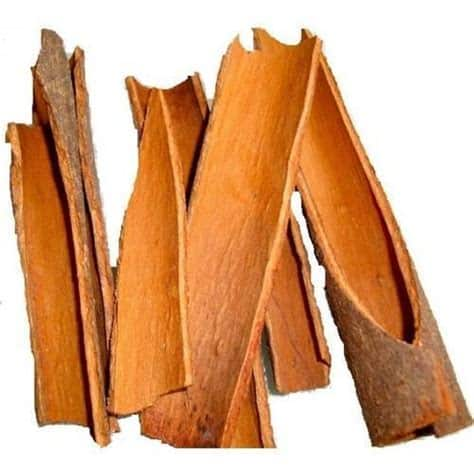
Scientific Name: Matricaria chamomilla
Higher Classification: Mayweed
Family Name: Asteraceae
Rank Name: Species
Order Name: Asterales
Kingdom: Plantae
Cinnamon
Published Date: 6/17/2023 5:57:12 AM
What is Cinnamon :
Cinnamon is a well-known old spice for its amazing aroma and sweet taste in nature. Wildly used as powdered, essential oil form to serve mankind. It promotes good digestion and reduces weight. It detoxifies the body and improves liver functions. Good relieves from diarrhea, irritable bowel syndrome, flatulence, and abdominal pain. (More Details)
Cinnamon :
- A Spice for the Ages from the Old Testament to the ancient Egyptians, many ancient cultures used cinnamon for anointing, preservation, and consumption. Cinnamon was so highly prized in the Middle Ages it was considered a luxury commodity and a status symbol. At one time, it was even more valuable than gold.
- Ancient Chinese medicine has long relied on this spice as a warming and cleansing agent to treat the heart, lungs, and bladder. (Chinese medicine uses Guizhou, made from the twigs of the cinnamon tree as opposed to the familiar cassia spice made from the inner bark).
- Today this spice still enjoys incredible popularity and resides in just about every spice cabinet.
- Just a mention of it probably brings to mind warm, comforting images like freshly-baked muffins, apple pie, oatmeal, or mulled apple cider.
- The awesome part is, it has benefits beyond being sweet and spicy !
What are its benefits :
- Regulates Blood Sugar : Perhaps the most well-documented benefit is cinnamon’s ability to regulate blood sugar. More study is needed as to what role the herb can play in pre-diabetic or diabetic treatment, but research shows hypoglycemic benefits from ingesting about 2 teaspoons a day.
- Anti-inflammatory : Studies show that the bark of the cassia variety strongly counteracts the enzyme responsible for inflammation. Add a pinch (or two or three) to drinks, recipes, or smoothies to get more anti-inflammatory benefits.
- Anti-microbial : Cinnamon bark oil is an especially effective antibacterial agent and has long been to disinfect and preserve. It has even been shown effective against E. coli. We use it in homemade tooth powder for its ability to kill the bacteria responsible for tooth decay decay. Our favorite store-bought option, OraWellness, explains why they include cinnamon in their mouth rinse: Recent research conducted in New Zealand demonstrated that the essential oil of cinnamon has the greatest antimicrobial potency against Streptococcus mutants, the bacteria responsible for tooth decay, and Lactobacillus Plantarum, one of the bacteria responsible in gum disease.
The research study concluded, “that there may be a role for essentials oils in the development of novel anticaries (anti-cavity) treatments.” - Anti-fungal : Certain species of cinnamon are effective against fungal infections, and it has even been used to treat oral candidiasis (a common symptom in HIV patients).
- Anti-viral : Cinnamomum cassia bark has been shown effective against viral respiratory illness, flu, and colds. Antioxidant Can we fit any more “anti” in here? Yes! Cinnamon also exhibits antioxidant influence on free radical cells. The C. zeylanicum species shows the most potent antioxidant effects, but Ceylon or the more common Cassia varieties offer these benefits as well.
- Lowers Blood Pressure : Since many compounds that help with insulin and blood sugar levels also lower blood pressure, cinnamon has benefits here too. In a study with rats, regular consumption lowered systolic blood pressure in hypertensive rats fed a high-sucrose diet (which makes my point about sugar)!
- For the Brain : Exciting new research shows that cinnamon may block a protein called tau in the brain. This is important because tau buildup is found in the brain of people with Alzheimer’s. The exact the mechanism isn’t clear yet, but this may be a promising use.
Ways to Use Cinnamon :
Here are some of my favorite ways to use it :
- In the Morning –Add a pinch to a cup of hot tea for a boost of energy (and sweetness) to start the day. Or, add some to your coffee! I like to add to the coffee grounds before brewing.
- For Colds and Flu – Take up to a 1/2 teaspoon in a cup of tea with lemon juice and honey, or add it to elderberry syrup.
- For Coughs – This herbal cough syrup is another immune-boosting way to use cinnamon.
- In a Tincture – Add cinnamon to a homemade tincture to increase absorption of the herbs and improve flavor.
- As a Digestive Remedy – I take a 1/2 teaspoon in water, tea, or capsule form after a meal out where I’ve consumed foods.
- As a Skin Soother – Mix some ground cinnamon with honey and apply it to insect bites.
And finally Of course there’s nothing wrong (and everything right) with getting this spice the traditional way in recipes like muffins, cobblers, and pancakes, or in drinks like tea, wassail.